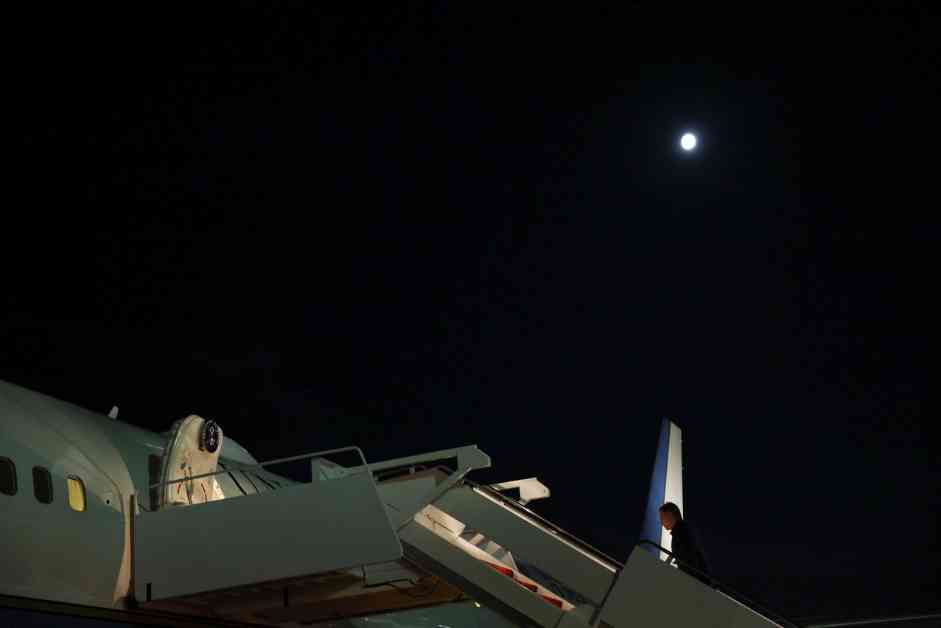US Secretary of State Blinken Meets Netanyahu Before Israel Attacks in West Bank and Gaza
US Secretary of State Antony Blinken met with Israeli Prime Minister Benjamin Netanyahu on the eve of a series of attacks in the West Bank and Gaza. The timing of the meeting raised questions about the US stance on the escalating conflict between Israel and Hamas.
Israeli Forces Strike in West Bank and Gaza
On the same day as Blinken’s meeting with Netanyahu, Israel claimed to have killed two senior Hamas members in an airstrike in the West Bank. The Gaza Health Ministry accused Israeli forces of attacking the central town of Zawaida in Gaza, resulting in the deaths of at least 17 Palestinians.
The Israeli security agency and defense forces identified the two slain militants as Ahmed Abu Ara and Rafet Dawasi, both from the northern West Bank near Jenin. The Palestinian Health Ministry confirmed that two bodies were brought to a hospital in Jenin following the Israeli airstrike.
Hamas’s armed wing, Al-Qassam Brigades, mourned the loss of the two fighters killed in the car targeted by the Israeli military. Israel alleged that the militants were involved in planning a shooting in the Jordan Valley last week that resulted in the killing of an Israeli man.
The Palestinian officials reported two fatalities in the Israeli airstrike on the occupied West Bank, while Israel claimed the target was a “terrorist organization” in the Jenin area. The Palestinian news agency WAFA stated that the attack was carried out by an “Israeli drone.”
In Gaza, health officials reported that Israel also attacked the town of Zawaida, resulting in the deaths of at least 17 Palestinians and injuring dozens more. Israel issued new evacuation orders citing rocket attacks from Hamas in the vicinity.
The majority of the victims in the Zawaida attack were from the same family, including eight children and four women. The timing of these attacks coincided with Blinken’s upcoming visit to Israel, raising concerns about the efficacy of US diplomatic efforts in de-escalating the conflict.
Efforts for Ceasefire Negotiations
President Joe Biden expressed optimism about nearing a ceasefire agreement in the Gaza Strip following talks in Doha, Qatar. However, Hamas dismissed the notion of an imminent truce, highlighting the complexities of reaching a peaceful resolution amid ongoing violence.
The ceasefire negotiations in Doha were temporarily halted as Israeli forces continued airstrikes in Gaza, intensifying the humanitarian crisis in the region. The US administration remains committed to brokering a ceasefire to end the hostilities between Israel and Hamas, emphasizing the need for a sustainable peace agreement.
Israeli Military Actions Draw International Condemnation
The Israeli military’s airstrikes in Lebanon, targeting a Hezbollah commander, further escalated tensions in the region. The consecutive days of attacks in Gaza and the West Bank have drawn condemnation from the international community, calling for an immediate cessation of hostilities.
The United Nations and other world leaders have expressed deep concern over the rising civilian casualties and destruction in Gaza and the West Bank. The indiscriminate targeting of residential areas and civilian infrastructure has raised alarms about potential war crimes and human rights violations.
Humanitarian Crisis Deepens in Gaza
The ongoing violence and airstrikes have exacerbated the humanitarian crisis in Gaza, with limited access to essential services and medical supplies. The United Nations Relief and Works Agency for Palestine Refugees (UNRWA) has warned of a critical shortage of food, water, and medical aid for the vulnerable population in Gaza.
The blockade imposed by Israel has further restricted the movement of goods and people, hindering humanitarian assistance efforts. The UN has called for the immediate lifting of the blockade to allow for the delivery of vital aid and supplies to those in need.
International Calls for De-escalation and Dialogue
As the conflict intensifies, world leaders have urged both Israel and Hamas to de-escalate the violence and engage in meaningful dialogue to resolve the root causes of the conflict. The United States, the European Union, and other key stakeholders have emphasized the importance of upholding international law and protecting civilian lives in the region.
The UN Security Council is set to convene an emergency meeting to address the escalating situation in Gaza and the West Bank, with a focus on immediate humanitarian assistance and a durable ceasefire agreement. The international community stands ready to support peace efforts and facilitate negotiations between the conflicting parties.
In conclusion, the recent spate of attacks in the West Bank and Gaza underscores the urgent need for a ceasefire and a lasting peace agreement to end the cycle of violence and suffering in the region. The diplomatic efforts of the US and other international partners play a crucial role in de-escalating tensions and promoting dialogue between Israel and Hamas. As the humanitarian crisis deepens, the focus remains on protecting civilian lives and ensuring access to essential services for the vulnerable population in Gaza and the West Bank.












